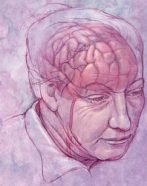Remembering Facts and Feelings
An inner-brain region called the hippocampus may be the root of memory of both experiences and fact.
By Emily Sohn
Can you describe everything you did last weekend, but you can’t remember a thing from last year’s social studies class? The difference may be all in your head.
New studies pinpoint an inner-brain region called the hippocampus as the root of memory for both experiences and facts. Researchers have disagreed, however, about which kind of information the hippocampus remembers best.
 |
|
An inner-brain region called the hippocampus may be the root of memory for both experiences and facts. |
In a recent journal, scientists led by Larry R. Squire of the University of California, San Diego, described six adults with hippocampus damage.
In one study, the six patients and 14 healthy adults read a list of names-some famous, some made up. The healthy-brained adults were able to pick out the famous people and say which ones were still alive. The brain-damaged patients remembered little about people who became famous after they suffered their injuries or in the 10 years before those injuries.
In a second study, the six brain-damaged patients could remember events from their childhood just as well as 25 healthy adults. But personal memories slacked off in the years just before and after their injuries. Together, the two studies suggest that the hippocampus controls memories of both facts and events.
The hippocampus may not be essential for kids’ ability to remember facts, though. One study of hippocampus-damaged children showed that they could retain new facts well enough to do okay in school. This might be because kids’ brains are able to reorganize themselves a lot.
Still, no matter how healthy your hippocampus may be, there’s no excuse to stop studying for your social studies tests!—E. Sohn
Going Deeper:
Bower, Bruce. 2003. Neural recall: Brain area may support fact and event memory. Science News 163(April 19):244-245. Available at http://www.sciencenews.org/20030419/fob4.asp .







